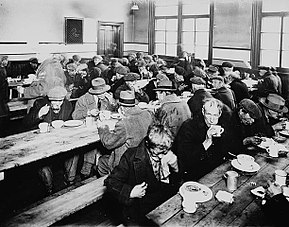
Due to the detrimental economic impacts of the stock market crash, during the Great Depression, millions of Americans were unemployed and got by with almost no income, causing the rise of apple sales and soup kitchens.
To this day, apple selling has remained a symbol of the Great Depression in New York. People who were once employed with stable jobs worked on street corners selling apples. It started as a strategic way for the unemployed to work again and for the apple industry to sell its surplus of apples. The chairman of the International Apple Shippers' Association, Joseph Sicker, worked with members of the industry to fund $10,000 worth of apples to sell to those who were unemployed. The person who was unemployed would buy the apples from the industry at a reduced price and sell them for profit. An average of 6,000 people sold apples in New York every day. Although the program ended due to its unprofitability for the apple industry, during its time, the program gave men a sense of pride that they had a job and it didn't let the apples go to waste.
Although apple selling brought people a small income, it wasn't enough to sustain them. Soup kitchens became a food source for the public. Al Capone, the notorious Chicago gangster, established the first soup kitchen to help improve his reputation and the well-being of the people by serving three meals a day. Over time, every city had soup kitchens run outdoors and in churches. To this day, soup kitchens are used to feed those who can't afford meals throughout the country.
Apple selling and soup kitchens did not in any way fix the Great Depression, but they did serve as a temporary aid to the people in need during the period.

https://www.history.com/news/apples-weapon-great-depression
http://exhibitions.nypl.org/lunchhour/exhibits/show/lunchhour/charity/hard
https://www.u-s-history.com/pages/h1660.html
https://www.history.com/news/al-capone-great-depression-soup-kitchen
http://www.american-historama.org/1929-1945-depression-ww2-era/soup-kitchens.htm
I found it really interesting how apple farmers worked with the poor to establish a system that tried to benefit both! The AAA also attempted to do the same thing and even payed farmers to destroy their crops. In 1933, $100 million were payed out to farmers to plow over their cotton crop back into the ground, and six million piglets that were bought by the government were slaughtered, and were later returned as canned pork for free. The AAA tried to help regular farmers much like the selling of apples attempted to help apple farmers and hobos in New York
ReplyDeletehttps://www.historylearningsite.co.uk/modern-world-history-1918-to-1980/america-1918-1939/farmers-and-the-new-deal/
This comment has been removed by the author.
ReplyDeleteThis blog was really interesting to read! I had no idea that today's soup kitchens (and apple selling) originated from the Great Depression. In addition to Al Capone opening soup kitchens, I researched that many were also run by private churches and private charities. However, by the 1930s, state and federal governments were also operating soup kitchens. I also learned that soup was the optimal food because water could be added to the soup to serve more people. It's interesting that these kitchens that helped the unemployed during the Great Depression continue to help the homeless today.
ReplyDeletehttps://www.u-s-history.com/pages/h1660.html